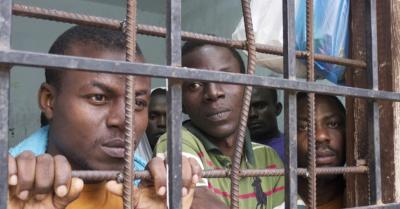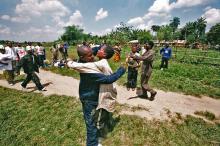Case prepared by Matthew Brown and Clara Burkard, LL.M. students at Leiden University under the supervision of Professor Robert Heinsch as well as Sofia Poulopoulou and Christine Tremblay, PhD researchers, Kalshoven-Gieskes Forum, Leiden University; with the contribution of Jemma Arman and Isabelle Gallino, LL.M. students at the Geneva Academy.
A. LIBYA: HARDSHIP AND DANGER REMAIN
[…]
ICRC delegates currently visit approximately 8,500 detainees in more than 60 places of detention. About 10 per cent of the people held are foreign nationals.
"We pay particular attention to the treatment of detainees and stress that their dignity must be respected at all times," said Georges Comninos, the head of the ICRC's delegation in Libya. "The current situation is complex and challenging, with many places of detention and many different authorities in charge." The ICRC has called upon the authorities at various levels to ensure that detainees are handed over to the Ministry of Justice and are placed in suitable detention facilities as soon as possible.
"While we remain committed to addressing any issues in a bilateral manner with those in charge, the current situation in Libya has confirmed that our work is needed in places of detention," said Mr Comninos. "Our expertise and the quality of the dialogue we have established with the authorities at all levels enable us to obtain certain improvements at this critical moment."
ICRC visits take place regularly. The organization's delegates talk in private with detainees of their choice in order to monitor the conditions in which these people are being held and the treatment they receive. All detention facilities and all detainees must be visited. The ICRC also looks into the detainees' need for medical attention, and detainees are given the opportunity to contact their families.
Between the beginning of March 2011 and the end of last year, the ICRC carried out some 225 visits in 100 places of detention in Libya.
In order to help ensure that conditions of detention are acceptable, the ICRC has also provided detainees with aid. More than 2,500 hygiene kits have been distributed to detainees in over 30 facilities throughout the country. In prisons in the Nefusamountains, Tajoura, Tripoli and Misrata, the supplies provided included over 3,000 blankets, 700 mattresses, and almost 2,900 sweaters and other winter items.
[…]
B. ICRC ANNUAL REPORT (LIBYA) 2013
Key Results/Constraints in 2013:
[…]
- detainees visited by delegates saw some improvements in their living conditions, brought about by direct ICRC support and work, while dialogue with the authorities on broader reforms began to shape slowly.
[…]
People deprived of their freedom (All categories/all statuses)
ICRC visits
Detainees visited 13,622
Detainees visited and monitored individually 280
Number of visits carried out 81
Number of places of detention visited 41
[…]
ICRC ACTION AND RESULTS
[…]
It often took numerous preliminary contacts with the authorities before delegates were able to visit people detained in connection with the 2011 conflict or with migration to Libya. They monitored detainees´ treatment and living conditions. The detaining authorities were given confidential feedback on the visits and on the various issues, particularly respect for judicial guarantees. Dialogue on broader reforms – regarding health services, the management of premises, etc. – began to take shape slowly. As a consequence of the ICRC´s support for and work with the detaining authorities, living conditions improved rapidly: this was brought about mainly by construction of outdoor recreational areas, improvements in the water supply system, disease-control campaigns and distributions of essential household and hygiene items.
[…]
Development of dialogue with detaining authorities delayed
Following ICRC visits, the detaining authorities – including the Defence, Interior and Justice Ministries, as well as revolutionary brigades subject to the process for bringing all places of detention under government oversight – received confidential feedback and recommendations for improvement. Treatment issues and individual cases requiring specific attention were among the subjects raised by the findings; as a result, some detainees were released on medical grounds.
[…]
Detainees gain better living conditions
The authorities dealt with certain deficiencies in the prison system with ICRC technical support, notably in relation to health case. This included input on a draft design for prison clinics and on ensuring that detainees underwent medical screening upon their arrival and had access to national health programmes.
[…]
Whenever security conditions permitted it, the penitentiary authorities and the ICRC worked to improve living conditions, particularly general hygiene, for detainees in selected prisons/retention centres. For example, in Tripoli, 1050 detainees in two prisons, and 150 migrants in one centre, had better access to daylight and fresh air after the construction/installation of an outdoor recreational area and windows in cells.
C. ICRC SAYS HAS VISITED GADDAFI SON IN PRISON
GENEVA Nov 22-The International Committee of the Red Cross (ICRC) said it had visited Saif al-Islam Gaddafi in detention in Libya on Tuesday.
"The ICRC visited Saif al-Islam Gaddafi this afternoon in Zintan. He appeared to be in good health," ICRC spokesman Steven Anderson told Reuters.
He declined to name the detention centre in Zintan, in the Western Mountains region, or give further details on the visit to Muammar Gaddafi's son and one-time heir apparent who was captured by Libyan fighters in the southern desert on Saturday.
The visit was in keeping with the ICRC's standard procedures, which include the right to interview detainees in private and make follow-up visits, Anderson said.
"The visit was one of many being conducted by ICRC delegates (officials) to people detained in Libya for the purpose of monitoring the conditions in which they are being held and the treatment they receive," he said. […]
In exchange for access, its confidential findings on conditions of custody and treatment of prisoners are given only to detaining authorities. The ICRC also carries messages between inmates and their families.
Yves Daccord, ICRC director-general, told a news conference on Monday that the agency had asked Libyan authorities to be allowed to visit Saif al-Islam in prison and that he was a person who needed "protection".
[…]
Discussion
I. Classification of the Situation and Applicable Law
II. Detention
4. Are civilians who are detained as part of ordinary criminal processes still subject to protections in IHL? Can the ICRC visit them? If yes, on what legal basis?
5. Is there an obligation for belligerents to release detainees whose medical condition would require it? In non-international armed conflicts?
III. Elements Contributing to Respect for IHL
8. What practical assistance can the ICRC provide to detention facilities? How can it actually be beneficial to detaining authorities?
9. Document B mentions the ICRC’s numerous contacts with the authorities. Do you think those contacts might contribute to further respect for IHL? How?
10. In your opinion, can the fact that persons deprived of liberty received proper treatment, and that their dignity was respected, while detained facilitate the return to peace at the end of hostilities? Why?





